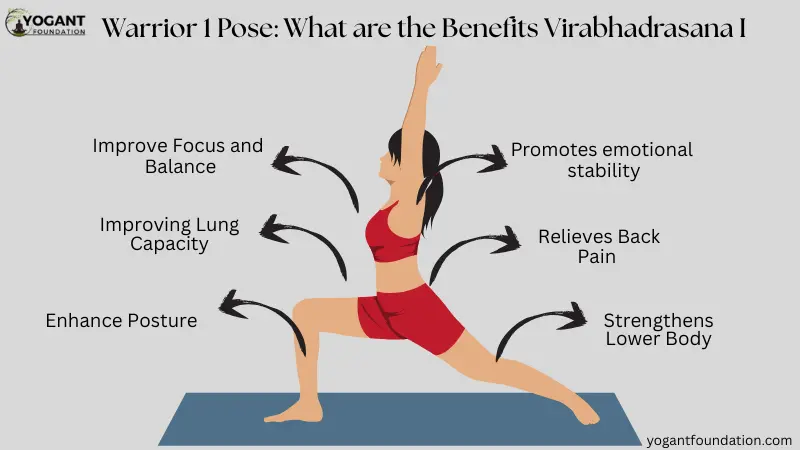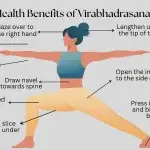Yoga is a discipline that has been practiced for centuries which combines physical body, the mental state and breath. One of its most famous poses, Virabhadrasana I, is known as Warrior Pose I. It shows determination, courage, and a calm, focused mind.
This pose honors the legendary warrior Virabhadra. It helps practitioners face challenges with calmness and strength.
In this post, we will discuss Virabhadrasana I. We will explain its importance and benefits. We will also talk safety tips for this pose. No matter your skill level, this pose offers valuable insights to share.
What is Virabhadrasana I?
Virabhadrasana I, also known as Warrior I, is a standing yoga pose. It strengthens the legs, opens the shoulders and chest, and helps improve focus.
The posture shows the spirit of a warrior. It gives stability to the body and calmness to the mind.
The term “Sanskrit” originates from Sanskrit:
Virabhadra = A strong warrior (a representation of Lord Shiva)
Asana = position, or seat
This pose represents the fight against self-doubt and insecurity. It encourages the practitioner to build confidence and self-esteem.
How to Do Virabhadrasana I (Step-by-Step Guide)
Step 1: Begin by doing
The Mountain Pose (Tadasana) Keep your body straight by bringing your feet in a straight line, and a straight spine. Relax your arms and let them naturally rest at your sides. Take a deep breath and put your feet down on the ground.
Step 2: Step Back
As you exhale and inhale then step back with your left leg, which results in a roughly 3-4 feet. Keep your right hand straight forward, and slightly pointed to the left (approximately 45 degrees).
Step 3: Align the Hips
Be sure that your hips are in the direction of the mat. Turn your right hip inward and turn your left hip to the side to make sure you have a proper pelvic alignment.
Step 4: Bend the Front Knee
Lower your left knee until it’s at the angle 90°. Ensure that your right knee stays just above your ankle, but do not extend it above. Be sure to have enough strength on your left leg.
Step 5: Raise the Arms
Take a deep breath as you raise your arms above your head. Keep your palms facing in the similar direction (or in the same way). Release your shoulders and make sure that they’re not touching your ears. Focus your eyes towards the sky or slightly to the side of your hands.
Step 6: Hold the Pose
You can hold this pose for 5 to 10 minutes. Breathe deeply, and notice the stretch through your hips, legs as well as your chest.
Step 7: Release
Exhale while stepping forward with your back foot and return back to Mountain Pose. Repeat the same sequence to the opposite side.
Benefits of Virabhadrasana I
Constantly doing Warrior Pose I provides a number of physical, mental and emotional benefits.
1. Builds Lower Body Strength
The exercise targets quadriceps and hamstrings and glutes, ankles, and quadriceps. It’s a great method to increase the strength of your legs.
2. Enhances Balance and Stability
A stable stance will improve your posture, balance and coordination. This leads to an increased perception of your own body.
3. Stretches Hips and Opens the Chest
Warrior Pose I, offer a stretching exercise that is deep to the hip flexors and increasing chest and shoulders. It increases flexibility as well as breathing capacity.
4. Increases Mental Concentration
Focus and alignment, which aids to sharpen your brain as well as cultivating a warrior’s mentality.
5. Invigorates the Body
Virabhadrasana increases the energy flow. This is why it’s perfect choice to start your day or whenever you want more energy.
6. Fosters Self-Confidence
The natural posture conveys the feeling of strength and confidence aiding in building confidence in yourself and ability.
Virabhadrasana I: Precautions and Contraindications
While Virabhadrasana I is usually safe, you should follow these precautions if you have knee injuries. Avoid extreme bending and change your posture as needed.
If you have back or hip problems consult an instructor in yoga for other yoga poses.
If you suffer from elevated blood pressure you should keep arm’s level instead of raising them above your head.
Women who are pregnant should exercise under supervision, especially during the third and second trimesters. Always be aware of your body, and stay away from any discomfort.
Virabhadrasana I: Variations and Modification
Place a yoga mat underneath the back heel in case you can’t get it to the level of the ground.
Try to practice close to a wall to gain balance support.
Shorten your stance in order in order to lessen the force in case you’re just starting out.
Tips for Beginners
Warm your legs and hips by doing postures such as Downward Dog and low Lunge or Cat-Cow before taking on Virabhadrasana I.
It is important to focus more on alignment rather than depth. just a little bend in your front knee when you are in a good posture will yield advantages.
Try to practice with the help of a mirror or yoga instructor to make sure you are practicing correctly.
Virabhadrasana I in Yoga Sequences
The pose is often used in the following:
Sun Salutations (Surya Namaskar)
Standing sequences taught in Hatha as well as Ashtanga Yoga
Flowing Vinyasa classes
You can pair it with Virabhadrasana II and III. This creates a strong sequence for warriors. It builds flexibility, strength, and focus.
Final Thoughts
Warrior I not just about the way we position our bodies. It about harnessing the strength within us.
In our fast-paced lives, this pose can serve as a reminder for us to remain focused, grounded and peaceful when faced with challenges.
Whether you are new to yoga or want to enhance your practice, Warrior Poses I is key to your daily routine.
Whether you are new to yoga or want to enhance your practice, Warrior Poses I is key to your daily routine. If you are new to yoga or want to improve, Warrior Pose I is an important part of your daily routine.
By regularly incorporating it, to build balance, strength and calmness both on the mat as well as off.
Read Blog – What is Virabhadrasana? – Benefits, Steps, and Contraindications




Pingback: How to do Virabhadrasana II (Warrior II Pose) with Benefits